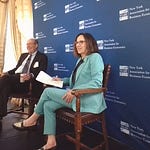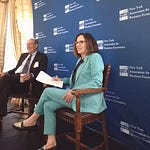Randy Kroszner is 100% behind the Federal Reserve’s decision to do a more aggressive 50bps rate cut as it starts down its post-pandemic path toward lower interest rates.
”Usually the Fed moves under Powell have been super, super clear. And this was a time where the markets had a 50 /50 chance — a 50 % chance of 25 basis points (rate cut) and a 50 % chance of 50 basis points, so I think it was a close call,” Randy says. “I thought that he was leaning in that direction. But the key was that he needed to make sure he got support from around the table.”
In fact, Powell did get the support he needed to do the 50bps rate cut but not what he needed to make the vote unanimous. Federal Reserve Board Governor Michelle “Mickey” Bowman surprised no one with her vote against it in favor of a 25bps rate cut after she has been arguing publicly for the Fed to move rates down more “gradually.”
As a former Federal Reserve Governor, Randy is in the Been There Done That camp of former Fed officials who have sat around the policy table at meetings and has a good sense of how things work even after they leave the Fed.
”Jay is not someone who likes a lot of dissents. And so he did get one dissent, but I think he might have gotten two dissents if he didn't go 50. And also I think he wanted to make sure the process was going and going with really getting it off the ground and moving in a way that could respond to the weakening of the labor market
“And so I think it makes sense that if they're going to start, they may as well start with 50 at this point, but it also would have made sense for them to do 25 at the previous meeting and 25 at this meeting.”
Randy says what’s driving Powell, Fed officials, and Board of governor staff economists is the recent slowdown in the labor market which has occurred as the inflation falls, the Fed’s key rate remains steady, meaning that real, inflation-adjusted interest rates have been rising.
“If you adjust the interest rate for inflation, the real interest rate, so basically subtracting inflation out from the nominal interest rate, that's been going up quite substantially as inflation has been coming down,” Randy says.
“ And so although the Fed hasn't explicitly changed the interest rate since last summer a year ago, as inflation has come down, the real rate has gone up. And so I think that's part of what is driving the slowdown in the labor market, he adds. “I think you'll also see that in the slowdown of an overall economic activity.”
Powell used the term “recalibration” over and over again at his press conference to explain what the Fed’s new policy is intended to do. Randy does not think the economy is in or headed to recession. He is not worried that inflation will start rising again as the Fed gets ready to do two or three more rate cuts this year depending on the data. He does think the Fed is wary of the long and variable lags in the impact of monetary policy on growth and inflation which is driving their decision to start the “recalibration” of their policy now.
Milton Friedman referring to the leads and lags in monetary policy “is just a very polite way of saying, we're not really sure how long it takes and how much it'll hit with. But he said that 75 years ago, and that's still true today,” Randy adds.
He believes this led Powell to make this decision to move, “and if you're gonna move boldly, particularly when you can probably have only one dissent at a 25 bps cut and you might have had two dissents at 50.”
So who would have dissented against a 25 bps cut?
Dive in and here what Randy has to say. And why he is not worried about a resurgence in inflation as the Fed starts cutting rates now, and much more.
Randall S. Kroszner is Norman R. Bobins Professor of Economics. He previously served as Deputy Dean for Executive Programs at Booth, as well as a Governor of the Federal Reserve System from 2006 until 2009. He chaired the committee on Supervision and Regulation of Banking Institutions and the committee on Consumer and Community Affairs. In these capacities, he took a leading role in developing responses to the financial crisis and in undertaking new initiatives to improve consumer protection and disclosure, including rules related to home mortgages and credit cards. He represented the Federal Reserve Board on the Financial Stability Forum (now called the Financial Stability Board), the Basel Committee on Banking Supervision, and the Central Bank Governors of the American Continent and was a director of NeighborWorks America. Dr. Kroszner chaired the working party of the Organization for Economic Cooperation and Development (OECD), composed of deputy central bank governors and finance ministers, on Policies for the Promotion of Better International Payments Equilibrium. As a member of the Fed Board, he was also a voting member of the Federal Open Market Committee.
From 2001 to 2003, Dr. Kroszner was a member of the President’s Council of Economic Advisers (CEA). He was involved in formulating policy on a wide range of issues, including responses to corporate governance scandals, government-sponsored enterprise reform, pension reform, terrorism risk insurance, tax reform, currency crisis management, sovereign debt restructuring, the role of the International Monetary Fund (IMF), and international trade and development.
Since 1990, Dr. Kroszner has taught at the University of Chicago Booth School of Business. Dr. Kroszner was Director of the George J. Stigler Center for the Study of the Economy and the State. He served as editor of the Journal of Law & Economics and has been associate editor of a number of other academic and policy journals. He was a member of the board of directors at the National Association for Business Economics and the Financial Management Association.












Share this post